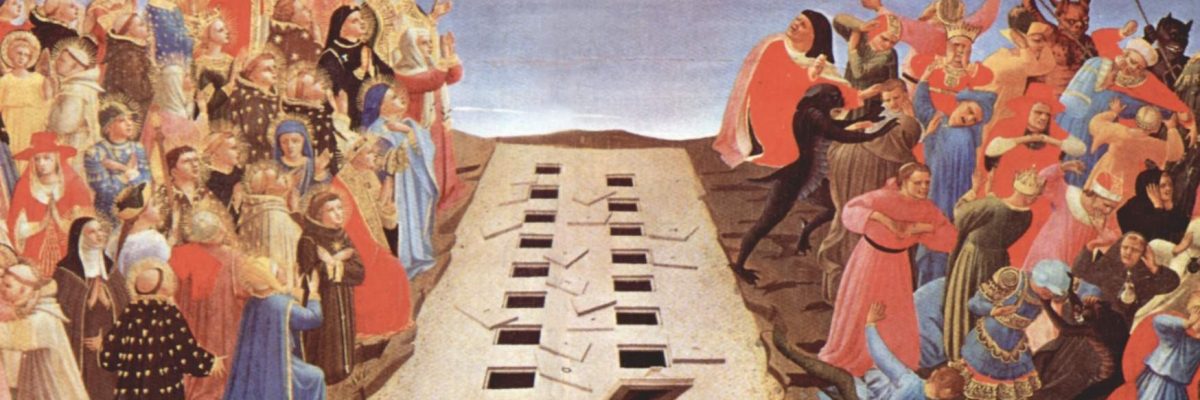
Homily for the Solemnity of Our Lord Jesus Christ, King of the Universe, Cycle A
Jesus said to his disciples:
“When the Son of Man comes in his glory,
and all the angels with him,
he will sit upon his glorious throne,
and all the nations will be assembled before him.
And he will separate them one from another,
as a shepherd separates the sheep from the goats.
He will place the sheep on his right and the goats on his left.
Then the king will say to those on his right,
‘Come, you who are blessed by my Father.
Inherit the kingdom prepared for you from the foundation of the world.
For I was hungry and you gave me food,
I was thirsty and you gave me drink,
a stranger and you welcomed me,
naked and you clothed me,
ill and you cared for me,
in prison and you visited me.’
Then the righteous will answer him and say,
‘Lord, when did we see you hungry and feed you,
or thirsty and give you drink?
When did we see you a stranger and welcome you,
or naked and clothe you?
When did we see you ill or in prison, and visit you?’
And the king will say to them in reply,
‘Amen, I say to you, whatever you did
for one of the least brothers of mine, you did for me.’
Then he will say to those on his left,
‘Depart from me, you accursed,
into the eternal fire prepared for the devil and his angels.
For I was hungry and you gave me no food,
I was thirsty and you gave me no drink,
a stranger and you gave me no welcome,
naked and you gave me no clothing,
ill and in prison, and you did not care for me.’
Then they will answer and say,
‘Lord, when did we see you hungry or thirsty
or a stranger or naked or ill or in prison,
and not minister to your needs?’
He will answer them, ‘Amen, I say to you,
what you did not do for one of these least ones,
you did not do for me.’
And these will go off to eternal punishment,
but the righteous to eternal life.”-Matthew 25:31-36
One day, long ago around the year 400, some sarcastic person told St. Augustine of Hippo, “I don’t want to have a kingdom; it’s enough for me if I’m just not damned.” This is the text from Sacred Scripture the cynic had just been discussing with his bishop:
Now the works of the flesh are manifest, which are these; Adultery, fornication, uncleanness, lasciviousness, idolatry, witchcraft, hatred, variance, emulations, wrath, strife, seditions, heresies, envyings, murders, drunkenness, revellings, and such like: of the which I tell you before, as I have also told you in time past, that they which do such things shall not inherit the kingdom of God (Gal. 5:19-21).
Saint Paul’s exhortation in Galatians 5 sounds very different from Our Lord’s words today in Matthew 25. In Paul’s account he stresses how the sins of the flesh, of passion, emotion, and bodily pleasure, cut one off from the kingdom of God. In Our Lord’s presentation of the Last Judgment, however, he tells us that neglecting the corporal works of mercy keep us from the kingdom that would otherwise have been prepared for us.
Sometimes this seems like a very big difference in tone, but this difference is exaggerated and misunderstood by many. Let me explain.
Say, for example, in my parish homily on this the Solemnity of Christ the King, I told the people that sins against purity or false religious opinions were mostly the ones that lead souls to hell. I might even add that this is what Our Lady said at Fatima to the three blessed children. You might imagine that I could have some pushback from the DRE or at the front door of the church afterwards, since these are rather unfashionable things to say. Say, on the other hand, I told people that if they neglect the poor and needy they risk losing their souls, and I even add some words of Pope Francis on the service of the poor. You can well imagine that no one would think to object to what I was saying.
Nowadays sins of the flesh are not regarded as being that bad, and it is often regarded as mean or unduly harsh to emphasize their malice to the point of warning that they lead to the fires of hell. But it is regarded as very respectable to emphasize our social duties toward the unfortunate. So one could easily imagine a modern-day version of Augustine’s objector telling the priest, “Look Father, I don’t need to inherit the kingdom reserved for the chaste and austere. I’ll just donate to the poor and needy, and that will get me into heaven. I don’t need a kingdom.”
But the fact is that there is a deep connection between the use we make of our pleasure appetites and emotions, and the way we treat those in need. A society which is steeped in the former will not be very caring toward the latter.
This is how Augustine responds to his objector in his homily on penance (Homily 351). Just after the line about not needing a kingdom, the great doctor of grace explains to this sinner-cynic:
For the Lord said “Since iniquity has abounded, the charity of many has grown cold; but he who perseveres to the end will be saved” He promises salvation to those who persevere in charity, not in iniquity. Where there is charity, then evil works which separate from the kingdom of God cannot exist, for “The whole law is fulfilled in what has been written ‘You shall love your neighbor as yourself.’”
Augustine’s point can be easily understood if we just ask ourselves this question: why would the goats, who are on the left, ready to be cast into the fires of hell, have neglected the works of mercy? What was it in them that led them not to notice the needs of others? Obviously, their selfish pursuit of pleasure and their own emotional satisfaction. The one set of sins, described by Paul, led to the neglect of the good works praised and rewarded by Our Lord.
There is no divorce between personal virtue and love of neighbor; indeed they are one and the same. After all, to “reign” means to care for the well-being of another, and since we are made in Christ’s image, we are bound to love him, and others as ourselves, and others as he loves them. So the best form of love of self is precisely to be like Christ and practice love of neighbor, and this is the opposite of sensuality. Anyone can see that lust and drunkenness make people mean and neglectful of their duties toward their neighbor, so anyone who wants to “persevere to the end” in the love of neighbor must also control his passions and desires.
St. Thomas says it so well (we have been following more or less his use of Augustine here) when he tells us:
A man loves himself more when he is zealous for the well-being and care of others, and he reserves for himself the better part, since it is more God-like for him to be a cause of well doing for others, than for himself alone.
May his love of neighbor make us like Christ our king. He will then count our service to others as done to himself and we will inherit the kingdom with him. Amen.



